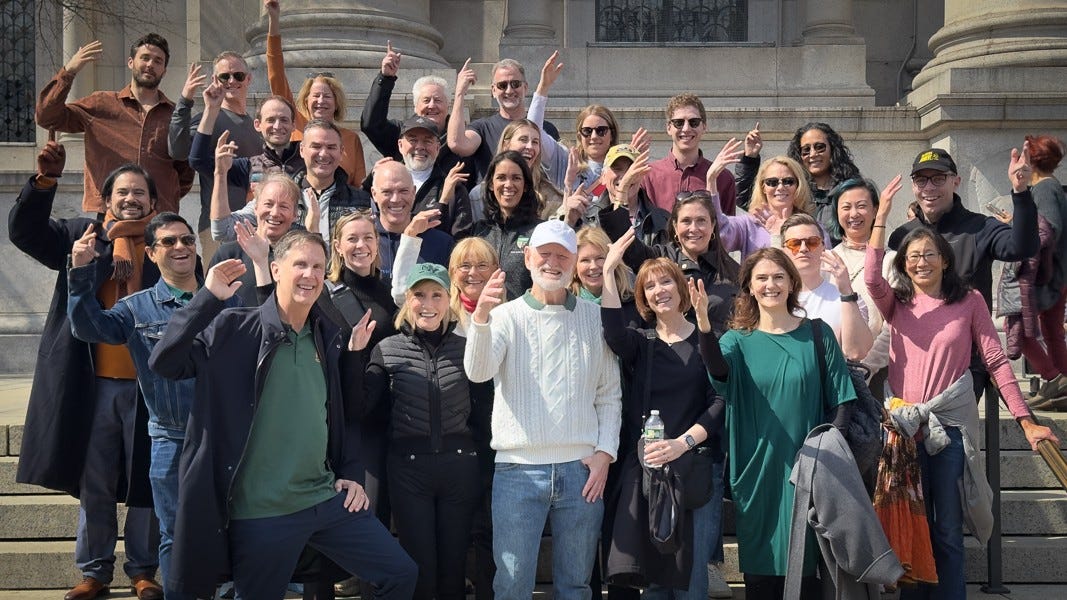This past weekend, we celebrated Marshall Goldsmith's birthday, bringing together members of the 100 Coaches community and agency for an annual celebration. The 100 Coaches Agency is a very disbursed team so we all came together for the weekend, a great chance to connect with each other and various members. To kick off the festivities, we saw Wicked on Broadway one of Marshall's favorite Broadway shows. It is a particularly appropriate show because of one of the show's hits. The song "For Good" is a duet from the musical Wicked, sung by Elphaba (the Wicked Witch of the West) and Glinda (the Good Witch of the North) as a farewell. For Marshall, the song has become something of an anthem. As we lost ourselves in the expansive story, beautiful stage and powerful music, I couldn't help but reflect on how the fundamental idea behind everything we do is that leadership is truly a force for good. This weekend of gathering was a beautiful expression of that notion, and it led me to ponder three ways in which leadership can be a positive influence.
Leadership is about improving people's lives—not just those who work directly with us but also the entire ecosystem of individuals connected to our businesses. As leaders, we can create environments that foster growth, fulfillment, and well-being. By prioritizing our team members' and stakeholders' needs and aspirations, we can cultivate a culture that uplifts and inspires everyone involved while meeting our goals and ambitions. When we lead with compassion and a genuine desire to make a positive impact, we set the stage for others to thrive personally and professionally.
Leadership is about building community and bringing people together for a common purpose. As we gathered this weekend to celebrate Marshall's birthday, effective leaders recognize the importance of fostering a shared mission. By creating opportunities for connection, collaboration, and mutual support, we strengthen the bonds that unite our teams and enable them to achieve great things together. By leading with a focus on community-building, we tap into our people's collective wisdom and energy, unlocking their full potential and driving meaningful change.
Leadership is about integrity and ethics in an increasingly complex world. As leaders, we have a responsibility to model the values and behaviors we wish to see in others. By consistently demonstrating honesty, transparency, and a commitment to doing what is right, we inspire trust and respect among those we lead. When faced with difficult decisions or challenging circumstances, leaders stand firm in their convictions and lead with moral clarity. In doing so, we navigate our organizations through turbulent times and contribute to shaping a more just and equitable society.
In life and leadership, we each have the extraordinary opportunity to be a force for good—to uplift and empower those we lead and love. As we reflect on the joyous celebration of Marshall's birthday and the camaraderie we created together this weekend, let’s remember that leadership is not just about achieving business objectives but about making a positive difference in the lives of others. By focusing on improving people's lives, building vibrant communities, and leading with integrity, we can create a ripple effect of goodness that extends far beyond our immediate sphere of influence. Lisa Earle McLeod McLeod calls this Noble Purpose. Hubert Joly calls it the Heart of Business. Marshall Goldsmith calls it An Earned Life. Whatever you call it, let’s strive to be the kind of leaders who leave the world a little better than we found it.
With love, gratitude and wonder,
Scott
In her latest newsletter from Istanbul, my friend Ayse reflects on the concept of core identity, exploring how formative experiences shape our fundamental selves even as our careers and roles evolve. She shares how she became certain of her path as a designer at age 15 after a family friend's conversation about industrial design, drawing parallels to renowned chef Alain Passard who discovered his culinary calling at 14. Ayse further illustrates this idea with examples from her partner Bibi Seck, whose childhood passion for drawing evolved from pen and paper to digital tools, and author Todd Cherches, whose difficult experiences with bullying and poor leadership inspired his commitment to helping others.
Ayse suggests that remembering our core identity provides stability during life transitions and offers the Japanese concept of Ikigai as a framework for reconnecting with our essential selves. This framework identifies the intersection of what we love, what we excel at, what the world needs, and what generates income. She concludes by encouraging readers to complete a quick Ikigai exercise to discover their "north star" and invites them to share their core identities in the comments section of her LinkedIn post.
The Power of Volunteering–Finding More Purpose in Your Life by Harry Kraemer, Jr.
Harry Kraemer, Jr. explores how volunteering can bring fulfillment beyond one's career, using Nick LoManto as a prime example. At 29, despite professional success as a financial manager at Vanguard and personal happiness in his marriage, LoManto felt something was missing. This led him to volunteer at his local fire station, where he now spends several hours weekly responding to emergencies. This community service provides him with a deeper sense of purpose than his corporate role alone.
Kraemer outlines three approaches to meaningful volunteering: recognizing that individuals can make a difference despite global challenges; starting small and immediate action rather than waiting for the "right time"; and remaining open to how volunteer experiences might inspire career changes. He shares examples of professionals whose volunteer work eventually shaped their career paths, including Patrick Lee who now leads Central Health in Texas, and Sahar Jamal who founded a social enterprise in Kenya after her volunteer experiences sparked her interest in women's health issues.
The Unlock Moment Newsletter: Lead with questions by Dr Gary Crotaz, PhD PCC
Dr. Gary Crotaz challenges conventional leadership wisdom by proposing that effective leadership isn't about having all the answers but rather asking the right questions. He argues that true leadership strength comes from the humility to empower others through thoughtful inquiry rather than providing ready-made solutions. According to Crotaz, this question-driven approach yields multiple benefits: it fosters team empowerment by encouraging critical thinking and ownership, promotes accountability by letting team members take responsibility for decisions, enhances innovation by welcoming diverse perspectives, and builds trust by demonstrating that leaders value their team's input.
Crotaz further reinforces his perspective by referencing his podcast conversation with Marshall Goldsmith, described as the world's top executive coach. Goldsmith apparently shared similar insights that upend traditional leadership concepts, suggesting that exceptional leaders distinguish themselves not through comprehensive knowledge but through their ability to ask thoughtful, intentional questions at opportune moments. This perspective frames leadership as a facilitating role that unlocks potential in others rather than being the singular source of direction and solutions.














Beautiful, Scott. Beautiful. Was so sorry I couldn’t make it to NYC for Marshall’s birthday. But so thankful to be a part of the 100 Coaches community and thankful to read your thoughts on leadership.